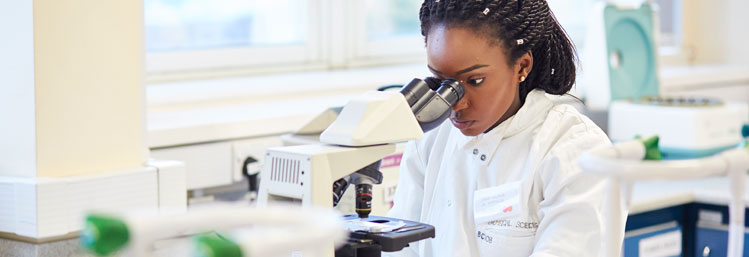
Pharmaceutical Technology and Medicines Control
MSc
- Duration
- Start date
- Location
Suitable for applications.
It was a very rewarding journey. This place makes you feel like home and everyone is so supportive. The atmosphere is well established to bring out the best in students; professors are highly experienced in their fields and the rest of the staff are well trained and friendly. Through our program, we came across technologies that are found in only a few spots around the globe. I completed my Masters with breakthrough novel results in my thesis, and the findings are being translated into three publications.
Learning and assessment
A wide variety of teaching and learning methods are employed to engage you in developing your subject knowledge and understanding including:
- formal lectures
- laboratory practicals
- demonstrations
- seminars
- workshops
- laboratory investigations
- critical appraisal
- coursework assignments
- directed study
The programme will progress from structured learning led by lectures and practicals, through to more seminar-based learning and to the individual research-based dissertation and project.
Different methods of assessment will be used as appropriate to the learning outcomes, including written examinations, oral presentations, experimental coursework reports, and, most importantly, an MSc dissertation.
Study support
Our comprehensive support services will help you to achieve your full potential – both academically and personally.
We provide all you need to make the very best of your time with us, and successfully progress through your studies and on into the world of graduate employment.
Our support services include:
- Personal tutors
- Disability services
- Counselling services
- MyBradford student support centres
- The Students’ Union
- Chaplaincy and faith advisers
- An on-campus nursery
- Halls wardens
We have well-stocked libraries and excellent IT facilities across campus. These facilities are open 24 hours a day during term time, meaning you’ll always find a place to get things done on campus.
Our Academic Skills Advice Service will work with you to develop your academic, interpersonal and transferable skills.
Research
This programme is mainly delivered by the Medicines Development and Pharmaceutical Sciences (MDPS) research group. The academics within this MDPS research group are also associated with one or more cross-departmental and cross-faculty research groups and centres. The major research themes of the group are within pharmaceutical sciences and medicines development.
The strong research component of the course provides you with the opportunity to demonstrate your scientific creativity and originality in applying your new-found knowledge and skills to develop ideas that are essential to the good pharmaceutical scientist.
